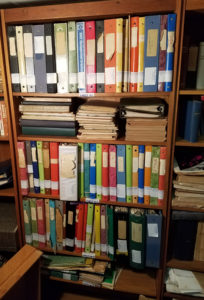BELMONT, Mass.—The National Association for Armenian Studies and Research (NAASR) has received one of the most significant archives of documents relating to the Armenian Genocide—the archive collected by the late Father Krikor Guerguerian—for research and study in NAASR’s Mardigian Library. These materials are considered “priceless” by noted scholar Prof. Taner Akçam, who relied on them heavily for his book Killing Orders: Talat Pasha’s Telegrams and the Armenian Genocide (Palgrave, 2018). Akçam holds the Robert Aram and Marianne Kaloosdian and Stephen and Marian Mugar Chair in Armenian Genocide Studies at Clark’s Strassler Center for Holocaust and Genocide Studies.

Among the important items in the Guerguerian archive are photographic copies of numerous official Ottoman telegrams which were used in the 1919-20 Military Tribunals but had since vanished, including one from Behaeddin Shakir, one of the founders of the Committee of Union and Progress (CUP), inquiring about details from the field on the deportations and killings of Armenians. Akçam considers this document as a clear expression of the CUP leadership’s genocidal intentions. The archive also contains photographic images of the now lost “Memoir of Naim Bey” published by Aram Andonian around 1920.
Father Guerguerian’s nephew, Dr. Edmund Gergerian of New York, preserved his uncle’s materials after his uncle’s death in 1988 and recently donated them to NAASR in April upon Akçam’s recommendation that the original materials come to NAASR and after meeting with NAASR’s Academic Director Marc Mamigonian.
“The Guerguerian archive is a tremendous addition to our rich Mardigian library holdings,” said Mamigonian. “Father Guerguerian collected materials from around the world and brought them together in one location. Many of these materials exist nowhere else or, if they do exist, are not accessible to the public.”

Father Guerguerian’s nephew had given Akçam access to the archives in 2015 and allowed him to digitize them. Akçam has plans to launch an online Guerguerian archive, partly through the support of grants from NAASR. “It is important, however, for researchers to have access to Guerguerian’s originals, in addition to the digital copies that Professor Akçam will be offering online,” noted Mamigonian.
NAASR’s headquarters in Belmont, where site work began in May for an all-new, state-of-the-art global center for Armenian Studies, will securely house this very special archive upon completion in 2019.
This donation has brought the Mardigian Library to a new level of importance for scholars and researchers worldwide, as well as recent donations of nearly 3,000 volumes from Prof. George Bournoutian of Iona College on Armenian history with particular attention to interactions with Russia and Persia; the extensive Armenian linguistics collection of the late Prof. John Greppin of Cleveland State University; hundreds of rare Armenian books from Harvard’s Widener Library; and thousands of volumes from Armenian rare-book collectors Abraham Krikorian and Gene Taylor of Long Island. “Many of these books are nearly impossible to find in this area outside of Widener Library at Harvard, and are available to the general public at NAASR,” says Mamigonian.
Father Krikor Guerguerian
Father Krikor Guerguerian was born in Gürün in the province of Sivas (Sepastia) in 1911. He was the youngest of a large family and lost his parents and many siblings and other family members during the Armenian Genocide. Educated at Bzommar Catholic Monastery and St. Joseph University in Lebanon, he continued his theological training in Rome at the Levonian Academy and settled in Cairo, Egypt.
In addition to his duties as a priest in Cairo and later in the U.S., Guerguerian devoted much of his adult life to researching the Armenian Genocide, traveling to important archival repositories, such as the Jerusalem Patriarchate and the Nubarian Library in Paris, where he photographed or copied crucial materials which are today either lost or inaccessible.
Publishing under the pen-name “Kriger,” he contributed a seminal, if still not widely known article entitled “Aram Antoneani Hratarakats Turk Pashtonakan Vaweragreru Vawerakanutiwne” (“The Authenticity of the Official Turkish Documents Published by Aram Andonian”) to the 1965 collection Hushamatean Mets Egherni (Memorial Book of the Great Crime), and wrote the volume Yozghati Hayaspanutean Vaweragrakan Patmutiwne (Documentary History of the Armenocide in Yozgat), published in 1980. However, among his archives are a number of unpublished book-length works, as well as vast amounts of notes and documents that he gathered for these projects and for others he was never fully able to realize.
Father Guerguerian was one of the pioneers of what is now the field of genocide studies. In his 1965 article on the Aram Andonian documents, he complained that “to this day no serious scholarly work has been presented to the discretion of the general public and the international public opinion concerning the Armenian massacres of 1915.” That is no longer the case thanks to several generations of scholars. The trailblazing work of Father Guerguerian will continue to contribute to the growth of that scholarly work, thanks to the accessibility of his archives.
About NAASR’s Mardigian Library
NAASR’s Edward and Helen Mardigian Library at NAASR, one of the largest publicly accessible Armenian libraries outside of Armenia, consists of nearly 30,000 books as well as thousands of periodicals, documents, and other items, primarily in Armenian and English, dating as far back as the late 17th century. The library is named in honor of the late Edward and Helen Mardigian in recognition of their commitment to the advancement of Armenian Studies and their decades of generous support to NAASR and its initiatives and the continued support of the entire Mardigian family.
Author information
The post NAASR’s Mardigian Library Receives Rare Guerguerian Archives of Ottoman Telegrams appeared first on The Armenian Weekly.
Source: Armenian Weekly
Link: NAASR’s Mardigian Library Receives Rare Guerguerian Archives of Ottoman Telegrams
